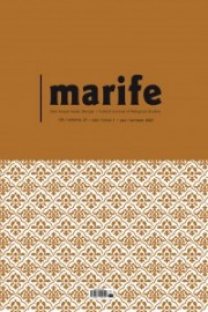Kur’ân’da Geçen (ﻞﻌﻟ ﱠ ﹶﹶ ) Edatının Anlamları ve Meallere Yansımaları
Arapçada bir edat olarak işlev gören (لعل َّ ََ ,( Kur’ân-ı Kerîm’de 129 yerde değişik bağlamlarda kullanılmıştır. (لعل َّ ََ ( kelimesi buralarda, dilin imkân verdiği farklı anlamlara (tereccî, ta‘lîl ve teşvik vb.) gelmektedir. Söz konusu anlamlardan ilki olan tereccî/ummak, “her şeyi hakiki mahiyetiyle bilen Allah Teâlâ’ya nisbet edilemeyeceği” gerekçesiyle müfessirlerce, “tereccînin muhatap için geçerliliği” şeklinde yorumlanmıştır. Bu nüans, bazı Türkçe meallerde yansıtılırken çoğunda yansıtılmamıştır. Buna ilaveten (لعل َّ ََ ( edatının (nehiy gibi) farklı manalarından bir kısmı kimi Türkçe meallerde yer alırken, kimilerinde, ya yer almamış ya da bağlama uygun tercüme edilmemiştir.
The Meanings of the Word "la'alla" (لعل َّ َ َ ( in The Qur'an and their Reflections into Turkish Translations
The word ( لعَ َّل َ (functions as a preposition in the Arabic language. It has been used one hundred and twenty-nine times in The Holly Qur’an. The word (لعل َّ ََ ( contains different meanings in the language according to the context, for example hope, cause, encourage etc. According to the commentators, ‘hope’ being the first of such meanings, is valid for interlocutor and not for God, because God knows everything at its true essence. While this nuance was reflected in some Qur’an translations, it was ignored in most. In addition, while some of the various meanings of the preposition (لعل َّ ََ ,( for example prohibition, were mentioned in some Qur’an translations, it has not been placed in the others or the translations were not suitable for the context.
Keywords:
Qur’an, tafsir (commentary), meal (translation), laalle, hope, cause, encourage, question, prohibition,
- Yayın Aralığı: Yılda 2 Sayı
- Başlangıç: 31.05.2001
- Yayıncı: Yediveren Kitap
Sayıdaki Diğer Makaleler
Yaşam Desteğinin Kısıtlanması Ya da Sonlandırılmasının Fıkhi Açıdan Değerlendirilmesi
Eser Başlıklarının Yorumsamacı Okunuşu Üzerine
Bati ve İslâm Dünyasında Karma Eğitim
Türk Belediyeciliğinin Milli Kökleri
Kur’ân’da Geçen (ﻞﻌﻟ ﱠ ﹶﹶ ) Edatının Anlamları ve Meallere Yansımaları
Biat Hadîsleri: Eğitim İlke ve Yöntemleri Açısından Bir Tahlil
Ergenlerde Dindarlık ve Sosyal Benlik
Endülüs’te Hadis İlminin Gelişim Aşamaları
Buhârî’de Dünya ve Ahiret Algısı (Kitâbu’r-Rikâk Örneği)
Niyet Amel İlişkisi Bağlamında “Ameller Niyetlere Göredir” Hadisi Üzerine Bir Yorum Denemesi
